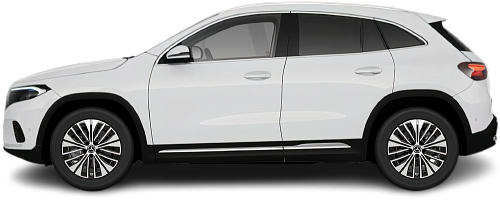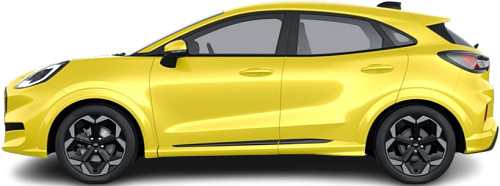USA EV Comparison: Mercedes EQA 250+ vs Ford Puma Gen-E FWD
Struggling to Decide? Let AI Help!
Your AI Summary Is Ready!
General Info
While both vehicles are currently in production, they are not sold in the United States.
The two vehicles share the same body style: SUV.
| Property | Mercedes EQA 250+ | Ford Puma Gen-E FWD |
|---|---|---|
| Years of Production | 2023-… | 2024-… |
| Current Status | Produced | Produced |
| Country of Manufacture | Germany, China | Romania |
| Body Style | SUV | SUV |
| Market Availability | EU | EU |
| GCC Score | 6.4 | 6 |
Range and Efficiency
While the Mercedes EQA 250+ (2023-…) offers a longer real-world range and a bigger battery, it is less energy-efficient than the Ford Puma Gen-E FWD (2024-…).
| Property | Mercedes EQA 250+ | Ford Puma Gen-E FWD |
|---|---|---|
| Range (WLTP) | 348 mi | 234 mi |
| Range (GCC) | 286 mi | 201 mi |
| Battery Capacity (Nominal) | 73.9 kWh | 46 kWh |
| Battery Capacity (Usable) | 70.5 kWh | 43 kWh |
| Efficiency per 100 mi | 24.7 kWh/100 mi | 21.4 kWh/100 mi |
| Efficiency per kWh | 4.06 mi/kWh | 4.67 mi/kWh |
| Range and Efficiency Score | 8.4 | 7.3 |
Charging
Both vehicles utilize a standard 400-volt architecture.
The Mercedes EQA 250+ (2023-…) offers faster charging speeds at DC stations, reaching up to 112 kW, while the Ford Puma Gen-E FWD (2024-…) maxes out at 100 kW.
The Ford Puma Gen-E FWD (2024-…) features a more powerful on-board charger, supporting a maximum AC charging power of 11 kW, whereas the Mercedes EQA 250+ (2023-…) is limited to 9.6 kW.
| Property | Mercedes EQA 250+ | Ford Puma Gen-E FWD |
|---|---|---|
| Max Charging Power (AC) | 9.6 kW | 11 kW |
| Max Charging Power (DC) | 112 kW | 100 kW |
| Architecture | 400 V | 400 V |
| Charge Port | CCS Type 2 | CCS Type 2 |
| Charging Score | 5.6 | 5.3 |
Performance
Both vehicles are front-wheel drive.
Although the Mercedes EQA 250+ (2023-…) has more power, the Ford Puma Gen-E FWD (2024-…) achieves a faster 0-60 mph time.
| Property | Mercedes EQA 250+ | Ford Puma Gen-E FWD |
|---|---|---|
| Drive Type | FWD | FWD |
| Motor Type | PMSM | PMSM |
| Motor Power (kW) | 140 kW | 124 kW |
| Motor Power (hp) | 188 hp | 166 hp |
| Motor Torque | 284 lb-ft | 214 lb-ft |
| 0-60 mph | 8.3 s | 7.7 s |
| Top Speed | 99 mph | 99 mph |
| Performance Score | 3.5 | 3.3 |
Dimensions
The Mercedes EQA 250+ (2023-…) is longer and taller, but about the same width as the Ford Puma Gen-E FWD (2024-…).
The Mercedes EQA 250+ (2023-…) boasts a more extended wheelbase.
| Property | Mercedes EQA 250+ | Ford Puma Gen-E FWD |
|---|---|---|
| Length | 175.7 in | 165.9 in |
| Width (with Mirrors) | 79.5 in | 76 in |
| Width (w/o Mirrors) | 72.2 in | 71.1 in |
| Height | 63.8 in | 61.2 in |
| Wheelbase | 107.4 in | 101.9 in |
Cargo and Towing
The Ford Puma Gen-E FWD (2024-…) features a larger trunk, but the Mercedes EQA 250+ (2023-…) offers greater maximum cargo capacity when the rear seats are folded.
A frunk (front trunk) is available in the Ford Puma Gen-E FWD (2024-…), but the Mercedes EQA 250+ (2023-…) doesn’t have one.
The Ford Puma Gen-E FWD (2024-…) has a towing capacity of up to 1653 lb, whereas the Mercedes EQA 250+ (2023-…) is not officially rated for towing in the US.
| Property | Mercedes EQA 250+ | Ford Puma Gen-E FWD |
|---|---|---|
| Number of Seats | 5 | 5 |
| Curb Weight | 4530 lb | 3446 lb |
| Cargo Volume (Trunk) | 12 ft3 | 18.5 ft3 |
| Cargo Volume (Max) | 46.6 ft3 | 45.3 ft3 |
| Cargo Volume (Frunk) | - Cargo Volume (Frunk) | 1.5 ft3 |
| Towing Capacity | - Towing Capacity | 1653 lb |
| Cargo and Towing Score | 6.4 | 5.9 |




